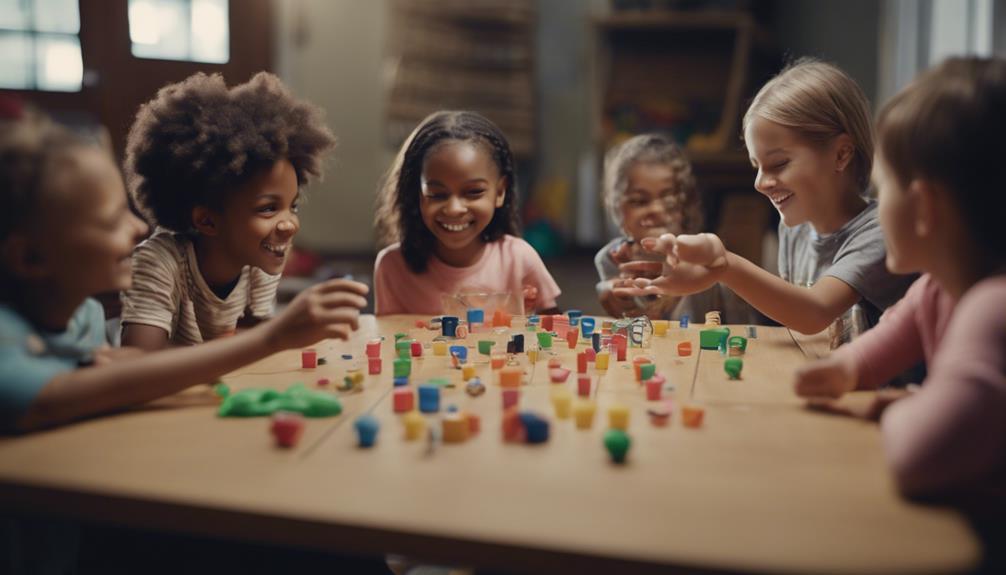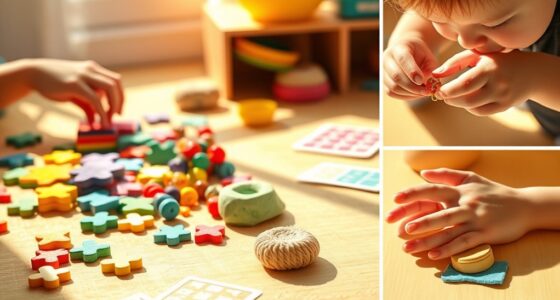Teaching your toddler sharing and turn-taking helps build their social skills and emotional understanding. You can encourage these skills through play, modeling positive behaviors, and offering praise when they wait patiently or share toys. Creating simple routines and using timers makes turn-taking clear and manageable. Recognizing signs of readiness allows you to support their progress effectively. Keep exploring different strategies, and you’ll discover many more ways to help your child develop these important skills.
Key Takeaways
- Model sharing behaviors and use positive reinforcement to encourage toddlers to take turns and share effectively.
- Create structured activities like sharing games and use timers to help children practice turn-taking.
- Use role-playing and storytelling to teach empathy and appropriate social responses during sharing situations.
- Recognize developmental milestones to tailor approaches and foster patience and understanding in social skill development.
- Incorporate daily routines and real-life scenarios to reinforce sharing and turn-taking as lasting social habits.
Understanding Why Sharing and Turn-Taking Matter

Have you ever wondered why sharing and turn-taking are so important? These skills help your toddler develop emotional empathy, allowing them to understand and respect others’ feelings. When children learn to take turns, they practice patience and build better social connections. Recognizing cultural differences is also key, as some cultures emphasize sharing and cooperation more than others. By encouraging these behaviors, you’re teaching your child to navigate diverse social situations with sensitivity and respect. Sharing and turn-taking foster trust, reduce conflicts, and promote a sense of community. These early skills lay the foundation for healthy relationships later in life. Incorporating social skills into their social learning can further enhance their ability to adapt and thrive in group settings. Understanding how tuning improves communication can also support their social development. Additionally, fostering contrast sensitivity can help children better interpret social cues and emotional nuances.
Recognizing Developmental Signs of Social Readiness

As your child begins to practice sharing and turn-taking, they also start showing signs of being socially ready. Look for increased emotional awareness, such as recognizing others’ feelings or comforting a peer. Language development is key; your child might use words to express needs or feelings, indicating they can communicate effectively. Notice if they initiate interactions or respond appropriately when spoken to. These behaviors show they’re developing social skills essential for sharing. You can track their progress with this table:
| Sign of Social Readiness | Description |
|---|---|
| Emotional awareness | Recognizes and responds to others’ feelings |
| Initiating interactions | Starts play or conversation without prompting |
| Responding to cues | Reacts appropriately to social signals |
| Using language | Expresses needs and feelings clearly |
Creating Opportunities for Sharing at Home

You can encourage sharing at home by modeling the behavior yourself, showing how to take turns and share toys. Playing sharing games together creates fun opportunities for your child to practice these skills in a natural way. Consistently demonstrating and practicing sharing helps your child understand its importance and develop confidence. Additionally, fostering a positive and supportive environment can promote social skills development and build your child’s emotional intelligence. Understanding the horsepower of electric dirt bikes can also inspire discussions about energy and power, enriching your child’s curiosity about how things work. Recognizing the performance of electric bikes can further introduce your child to concepts of technology and innovation in a relatable way. Incorporating relationship compatibility concepts can help children understand the importance of sharing and cooperating in friendships. Exploring the essential oils for social comfort may also provide soothing scents that promote a calm and friendly atmosphere at home.
Model Sharing Behaviors
Creating opportunities for sharing at home starts with modeling the behavior yourself. Children learn by observing, so demonstrate sharing behaviors regularly. When you share your snacks, toys, or belongings, your child sees what sharing looks like in action. Use phrases like “Let’s share this” or “It’s nice to share with friends” to reinforce positive sharing habits. Show patience and praise when they try to share, even if it’s challenging at first. Your consistent modeling sharing teaches them that sharing is a natural part of interactions. Remember, children pick up on your attitude towards sharing—if you’re enthusiastic and respectful, they’re more likely to follow suit. By actively demonstrating sharing, you create a supportive environment that encourages your toddler to develop these essential social skills. Incorporating social skill development into everyday routines helps reinforce these behaviors even further. Utilizing creating a positive environment can make sharing feel more inviting and less stressful for young children. Consistent practice with sharing opportunities helps solidify these skills over time. Engaging in interactive play can also promote sharing and turn-taking in a fun, natural way. Incorporating remote or virtual activities can also introduce new ways for your child to practice sharing in a digital context, aligning with modern social interactions.
Use Sharing Games
How can you make sharing fun and engaging for your child? Try introducing sharing games and turn-taking activities that encourage cooperation. You can play simple games like passing a ball back and forth or sharing toys during pretend play. These activities teach your child patience and the importance of taking turns. Use timers to signal when it’s time to switch, making the process clear and predictable. Incorporate storytelling or role-playing to reinforce sharing behaviors in a playful way. By regularly engaging in these sharing games, your child learns that sharing can be enjoyable and rewarding. Keep activities short and positive, celebrating your child’s efforts to take turns. Additionally, vetted newborn baby products can help create a safe environment for these activities. Creating a calm and comfortable setting can also enhance your child’s willingness to participate and share. Understanding the psychology of sharing can further motivate your child to develop generous habits. Incorporating home decor elements such as cozy spaces or visually stimulating environments can make sharing more inviting and enjoyable for young children. Over time, these structured opportunities help develop natural sharing habits at home and beyond.
Using Play to Teach Sharing Skills
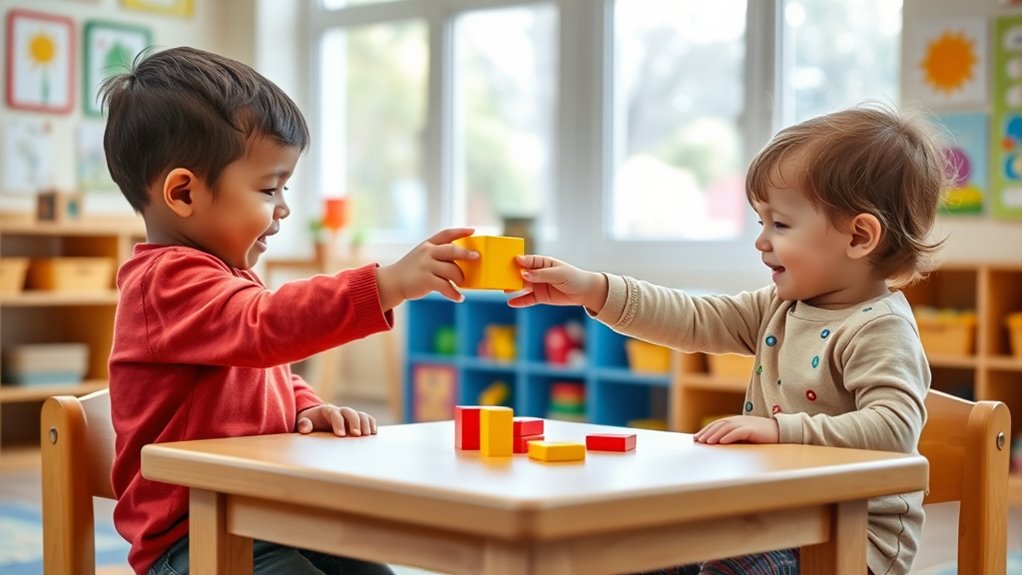
Play provides an engaging way to teach children essential sharing skills because it naturally encourages interaction and cooperation. When you incorporate play, you help children understand sharing benefits and develop turn-taking techniques effectively. To maximize this approach:
- Use shared toys during play sessions to promote collaboration.
- Model patience and wait for their turn to reinforce turn-taking skills.
- Praise efforts when children share or take turns, strengthening positive behavior.
- Introduce simple rules that highlight the importance of fairness and reciprocity.
- Incorporating understanding of social interactions can enhance their overall social development and confidence.
These strategies create a fun learning environment where children see sharing as rewarding. Play not only teaches social skills but also builds their confidence in social interactions, making sharing an enjoyable part of their daily routine.
Role-Playing and Modeling Positive Behaviors
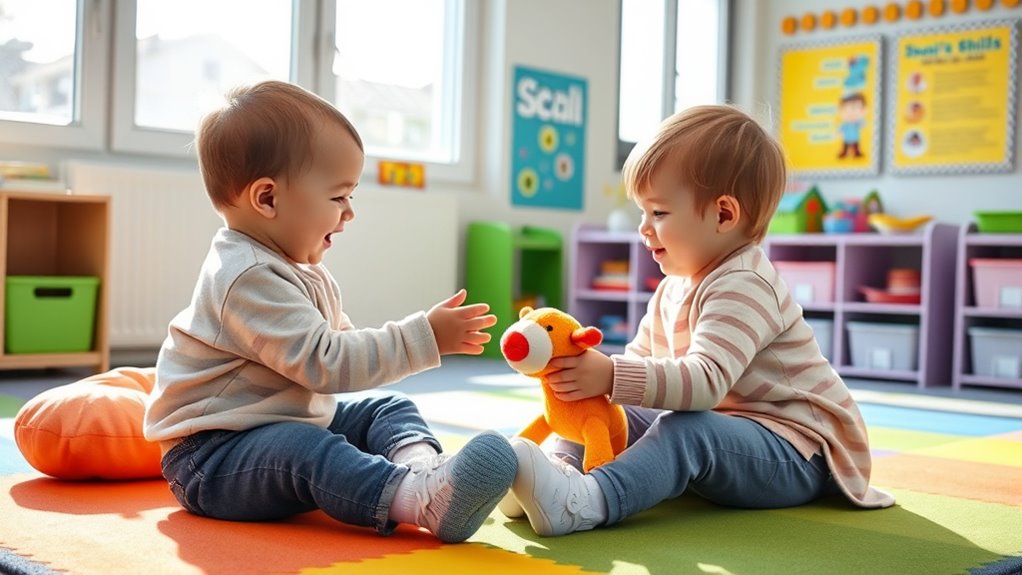
Role-playing and modeling positive behaviors are powerful tools for teaching children how to share and take turns. By setting up role play scenarios, you give your toddler a safe space to practice sharing with others, helping them understand social cues and appropriate responses. When you demonstrate positive behaviors yourself, like waiting patiently or offering toys kindly, your child learns through observation. Use positive reinforcement to praise their efforts, encouraging continued practice. For example, if your child shares a toy during a role play, acknowledge their good behavior with specific praise. Consistently modeling respectful interactions and reinforcing these actions helps your toddler develop essential social skills. Over time, they’ll internalize these behaviors, making sharing and turn-taking more natural in everyday situations. Understanding social development milestones can guide you in supporting your child’s progress effectively.
Strategies for Managing Sharing Challenges
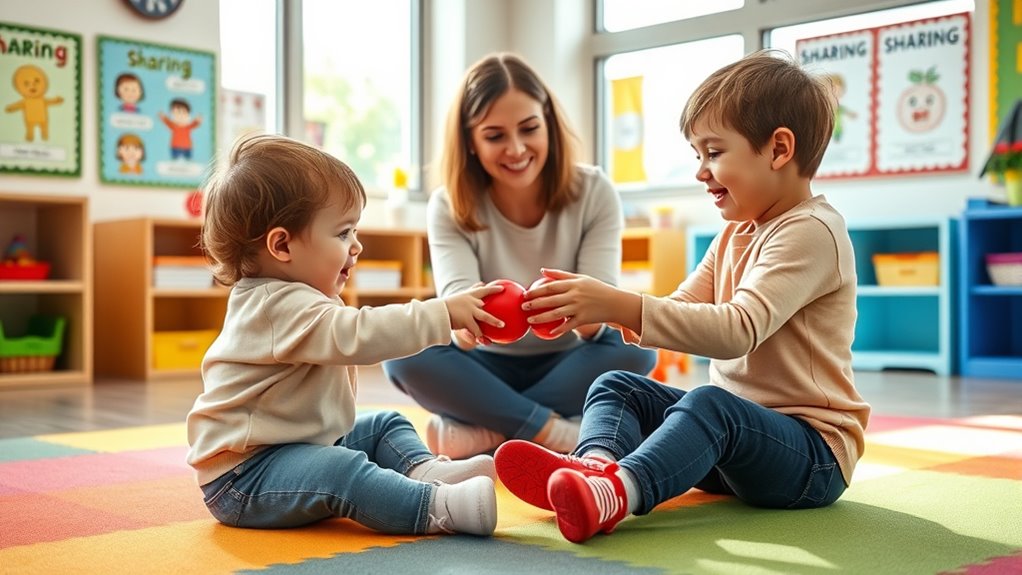
Managing sharing challenges requires patience and proactive strategies. When facing sharing conflicts, your goal is to guide your toddler toward positive solutions. Here are effective turn-taking strategies to help:
- Set clear rules: Establish simple, consistent expectations about sharing and taking turns.
- Create opportunities: Encourage your child to practice sharing during structured activities.
- Use timers: Implement timers to help your toddler understand when it’s their turn and when it’s someone else’s.
- Model patience: Demonstrate calm, respectful behavior during sharing conflicts, showing your child how to handle frustration.
- Understand developmental milestones: Recognizing typical family photoshoot fails helps you stay patient and adapt your approach as your child grows. Additionally, understanding indoor air quality can inform your environment, making it more comfortable and less stressful during conflicts.
Reinforcing Sharing and Turn-Taking With Praise

Celebrating moments when children share or take turns reinforces positive behavior and encourages continued effort. Use specific praise words to highlight what they did well, like “great sharing” or “excellent turn-taking.” Encourage children to recognize their peers’ efforts, which boosts confidence and promotes a supportive environment.
Celebrate Sharing Moments
Sharing moments of success and kindness helps children understand the value of turn-taking and cooperation. By actively celebrating sharing moments, you reinforce positive behavior and motivate your toddler to continue practicing social skills. To effectively promote turn-taking opportunities, consider these steps:
- Recognize when your child shares or takes turns, and say, “Great job!”
- Highlight specific actions, such as “You waited patiently for your turn.”
- Use enthusiastic language to emphasize the importance of sharing.
- Create opportunities for regular sharing experiences, like group play or simple games.
Celebrating these moments encourages your child to see sharing as rewarding and fun. This approach helps build confidence and reinforces the social skills necessary for future interactions, making shared experiences more natural and enjoyable.
Use Specific Praise Words
Using specific praise words when your child shares or takes turns can greatly strengthen their understanding of positive social behavior. By offering clear, targeted positive reinforcement, you help your child recognize exactly what they’re doing well. For example, saying, “Great job sharing your toy!” or “I love how you waited your turn patiently,” emphasizes specific actions. Additionally, using emotional labeling such as “You must feel happy when you share,” helps your child connect feelings with their actions. This approach reinforces the idea that sharing and turn-taking are valued behaviors. Consistent, specific praise boosts confidence and encourages your child to repeat these behaviors. Over time, they learn that positive social interactions bring favorable responses, making sharing and turn-taking natural parts of their social development.
Encourage Peer Recognition
Have you noticed how acknowledging peers’ positive behaviors can reinforce sharing and turn-taking? Encouraging peer recognition boosts social validation, making children feel valued and understood. To promote this, you can:
- Highlight specific actions, like sharing toys or taking turns.
- Use praise that emphasizes effort, such as “Great job sharing!”
- Encourage children to compliment each other’s actions.
- Model peer recognition by praising children when they demonstrate sharing or patience.
Extending Skills Beyond the Playroom
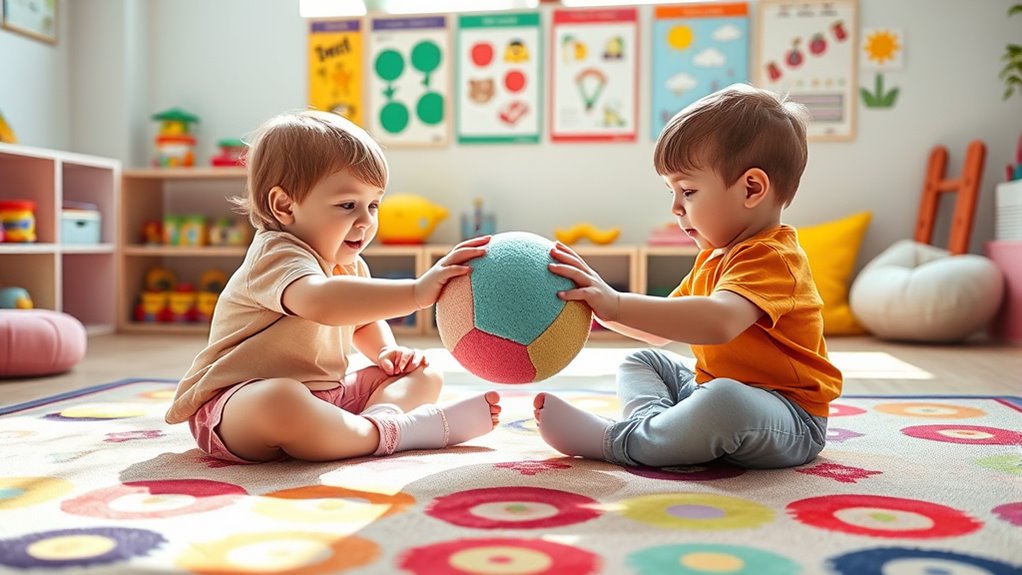
To help children apply their sharing and turn-taking skills beyond the playroom, you can intentionally create opportunities for practice in everyday situations. Use gratitude exercises, like asking your child to say thank you when someone shares something with them, to reinforce positive social behavior. Encourage empathy development by discussing how others might feel when they share or take turns, helping your child understand different perspectives. When shopping or at a family gathering, prompt your child to practice patience and sharing with siblings or friends. Highlighting these moments as teachable opportunities helps them see the value of their social skills in real life. Consistent practice fosters lasting habits, supporting your child’s growth into a considerate, empathetic individual.
Frequently Asked Questions
How Can Parents Handle Conflicts During Sharing?
When conflicts arise during sharing, you can use sharing strategies to guide your toddler. Calmly intervene and model conflict resolution by encouraging them to express feelings and find solutions together. Use gentle reminders about taking turns and reinforce positive behavior with praise. Staying patient and consistent helps your child learn to navigate conflicts effectively, building their social skills and confidence in sharing situations.
What Are Common Mistakes When Teaching Turn-Taking?
Many parents overlook that rushing or expecting instant compliance can hinder learning turn-taking. You might model consistency and set age-appropriate expectations, but if you rush your child or get frustrated, they won’t grasp the concept. Instead, be patient, give clear cues, and reinforce positive behavior. Remember, toddlers are still learning; mistakes are normal. Your steady guidance encourages them to develop these vital social skills effectively.
How Do Cultural Differences Affect Sharing Behaviors?
Cultural differences markedly influence sharing behaviors by shaping cultural norms and sharing expectations. You might notice that in some cultures, children are encouraged to share openly and generously, while others prioritize individual ownership. Understanding these cultural norms helps you recognize that sharing isn’t just about rules but reflects deeper values. By respecting these differences, you can better support children’s social development and foster positive interactions aligned with their cultural backgrounds.
When Should Parents Seek Professional Help for Social Skills Delays?
Remember, “early bird catches the worm.” If your toddler struggles with social skills or misses developmental milestones, don’t wait. Seek professional help when you notice persistent difficulties in sharing, taking turns, or forming friendships beyond the typical age range. Early intervention can make a significant difference. Trust your instincts and consult a specialist if concerns linger, ensuring your child’s social skills develop healthily and confidently.
How Can Caregivers Support Shy or Introverted Toddlers in Sharing?
To support shy or introverted toddlers in sharing, you should focus on building confidence and encouraging participation. Gently invite them to share their toys or ideas, offering praise when they do. Create a safe, supportive environment where they feel comfortable trying new social skills. Use patience and positive reinforcement to help them gradually become more comfortable sharing, helping them develop social confidence at their own pace.
Conclusion
By fostering sharing and turn-taking now, you’re setting the stage for your toddler’s future relationships. But remember, each small step builds toward something bigger—trust, empathy, connection. As you continue guiding and encouraging, you might soon realize these early lessons shape more than just play; they shape a lifetime of understanding. Are you ready to see how these simple skills can open a world of meaningful bonds? The next chapter starts today.



